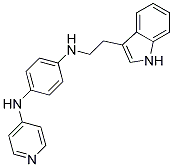All AbMole products are for research use only, cannot be used for human consumption.

JNJ-26854165 (Serdemetan) is a p53-activating agent with antiproliferative activity in various p53 wild-type (WT) tumor cell lines. JNJ-26854165 inhibited clonogenic survival in all cell lines, but in a lower extent in p53-null-HCT116. JNJ-26854165 also inhibited proliferation, capillary tube formation and migration of HMEC-1 cells. JNJ-26854165 demonstrated cytotoxic activity in vitro. In vivo, JNJ-26854165 (Serdemetan) caused a greater than additive increase in tumor growth delay. JNJ-26854165 induced significant differences in EFS distribution compared to control in 18 of 37 solid tumors and in 5 of 7 of the evaluable ALL xenografts in vivo. JNJ-26854165 (Serdemetan) treatment at 0.25μM in H460 and at 5μM in A549 cells resulted in a sensitivity-enhancement ratio of 1.18 and 1.36, respectively. JNJ-26854165 treatment induced p53-mediated apoptosis in acute leukemia cells with wild-type p53, in which p53 rapidly drives transcription-independent apoptosis followed by activation of a transcription-dependent pathway. JNJ-26854165 accelerated the proteasome-mediated degradation of p21 and antagonized the transcriptional induction of p21 by p53. JNJ-26854165 is currently being evaluated in Phase I clinical trials.
| Molecular Weight | 328.41 |
| Formula | C21H20N4 |
| CAS Number | 881202-45-5 |
| Solubility (25°C) | DMSO 60 mg/mL |
| Storage |
Powder -20°C 3 years ; 4°C 2 years In solvent -80°C 6 months ; -20°C 1 month |
| Related p53 Products |
|---|
| Pifithrin-α, p-Nitro, Cyclic
Pifithrin-α, p-Nitro, Cyclic (PFN-α) is cell-permeable and active-form p53 inhibitor. Pifithrin-α, p-Nitro, Cyclic behaves as a p53 posttranscriptional activity inhibitor. Pifithrin-α, p-Nitro, Cyclic do not prevent p53 phosphorylation on the S15 residue. |
| PK095
PK095 is a p53 mutant stabilizer. |
| HLI373
HLI373 is an efficacious Hdm2 inhibitor. |
| Cjoc42
Cjoc42 is a compound capable of binding to gankyrin. |
| MDM2-IN-1
MDM2-IN-1 is a synthetic MDM2-p53 interaction (MDM2) inhibitor and contains the trans (D-)configuration. |
All AbMole products are for research use only, cannot be used for human consumption or veterinary use. We do not provide products or services to individuals. Please comply with the intended use and do not use AbMole products for any other purpose.


Products are for research use only. Not for human use. We do not sell to patients.
© Copyright 2010-2024 AbMole BioScience. All Rights Reserved.
